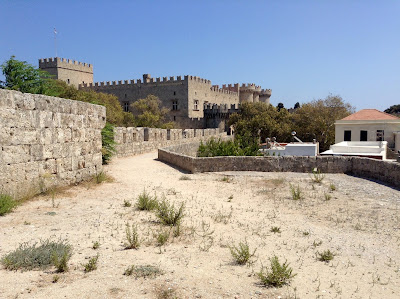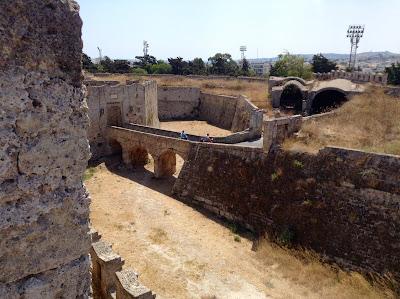Stergos and I were talking while the coach's wheels covered ground on the way back from Rhodes Town the other day. The subject came up of a mutual friend who's only around 30 years of age, yet has some rather alarmingly old-fashioned ideas about women.
The person in question looks modern, with that hairstyle that so many young men seem to think is cool these days, where both sides of the head are shaved to a No.1 (G.I. Joe) shortness on both sides and around the back, but the top still has flowing locks that need keeping in place with copious quantities of gel or the like. At least he doesn't sport one of those ridiculous mega-short pony tails, held in place with an elastic band, on top of his head that always have me longing for a pair of sharp scissors whenever I see them. He wears cool shades and goes to the gym a lot. Yet when you have a conversation with him, he'll often betray a woefully archaic attitude, not to say 'understanding' (misunderstanding?) of women.
For instance, if he sees any driver making an error of judgment on the road, his first words will always be "Woman. It's a woman."
If he's wrong he'll move swiftly on. If, however, he's right, he'll continue with expressions like: "See, women aren't genetically suited to driving, Yianni. It's not conducive to their emotional makeup. They're better suited to keeping home. They're dangerous, what with all their emotions and stuff. Plus they think mirrors are only fitted so they can touch-up their lipstick."
I could go on, but I sense some real anger issues with some readers already coming to the surface, right?
Stergos, who was with me and sitting behind the wheel during this particular conversation, is probably around sixty, still in fairly good shape, with a good head of mainly white hair swept back from his forehead. He has one of those archetypal Greek male voices. You know, the type that sounds like he's smoked for decades and gargles with loose gravel. I should point out that, while he may well have been a smoker in the past, Stergos doesn't smoke today. Taking into consideration his age, though, you may have expected that he would hold slightly outdated views on women's place in society, but none of it. His first wife died after a long illness and he is proud to point out that he is a 'new man' in the sense that he wasn't embarrassed to have done everything around the house while his wife was ill.
It is a basic truth that most Greek men are rather stereotypical in their views of what constitutes a woman's work and what is a man's. I know very few Greek men who'll get anywhere near the kitchen sink, or indeed the washing machine. An ironing board I suspect they'd not even recognise. My friend Stergos, however, tells me that, first and foremost, even though he says that once a man gets in through his front door, he ought to recognise that he's now in his wife's domain, what she says goes, as it were, he says this out of respect and awe for a woman's capabilities and not because he feels that a woman's place is in the home.
No, Stergos proudly confesses to believing that what's done in the home should always be a matter of sharing the load by both partners in the relationship. He knows how to load up and programme the washing machine, he knows how to iron a shirt or press some trousers, he knows what a duster is. And thus he, although of an older generation, introduced me to a thought from his old Papou (grandfather).
"Yianni," he said, "My old papou always used to say that all men are like wood. I'll explain. Some woods are very hard, they take skill to work and yet can be transformed into beautiful pieces, perhaps of furniture, for example. A well-carved, inlaid and polished oak table is a piece that you keep for life. It elicits expressions of awe from those who examine it. It has great value. Other woods, like pine, for example, are not so high in quality. These are more suited to rough cabinets or shelving you might put up in your outhouse. Then there are woods of such poor quality that the best you can do with them is to burn them, for heat perhaps. Firewood.
"My papou said that men are like that. Some are intelligent, caring people. These men become loved, highly valued, by those who know them. You want to be around them. They are like high quality oak. Sadly, though, some are so 'rough' in ways and thought that you don't hold them in such high esteem. The firewood, as it were. The type of wood someone becomes has much to do with how educated they are."
I began to see where he was coming from. Returning to the subject of our mutual friend, who is due to get married to his very beautiful fiancée later this year, Stergos said: "Yianni, our friend may look young and modern, but at heart he is a 'horiatis.' Still holds the values he learned from his country village upbringing. He's going to have trouble with his new wife if he doesn't change his tune. He doesn't seem to want to educate himself in this field."
I've met our friend's fiancée. I replied that I thought that perhaps she was aware of her future husband's views and yet nurtured the idea that she'd whip him into shape once they were married. Not that I think that this would necessarily work, mind you. It's often the recipe for a failed marriage in my experience (not my personal experience, of course). Maybe, though, she is strong of character and knows that she won't stand any messing. I do know that she drives, since I asked our friend if she did one time when he was sounding off about how women shouldn't be driving owing to their inherent emotional nature. When he replied that she did, I asked him, "So what are you going to do about that when you're married? Do you think she'll knuckle under and stay at home?"
The awkward smile he gave me by way of a reply indicated that he was finding that one a bit of a quandary.
The two of us, Stergos and myself, like our young friend as a person, it's not that. But we're both realistic about him too and we shall be watching he and his new wife with interest and concern for quite a while after they tie the knot.
I'd be interested to hear from other ex-pats like myself who've lived here in Greece for any length of time about their experience in this area. What abiding impressions do they have of the stereotypes? Do they feel as I do that your average Greek man, at least in rural areas, is still stuck some time in the past when it comes to male-female equality?






































